- Home
- Lois Lowry
Switcharound
Switcharound Read online
Switcharound
Lois Lowry
* * *
Houghton Mifflin Company
Boston
Library of Congress Cataloging-in-Publication Data
Lowry, Lois.
Switcharound.
Summary Forced to spend a summer with their father
and his "new" family, Caroline, age eleven, and J P., age
thirteen, are given unpleasant responsibilities for
which they are determined to get revenge
[1. Brothers and sisters—Fiction. 2 Family life—
Fiction. 3 Humorous stories] I. Title. II. Title.
Switch around.
Switcharound.
PZ7L9673SW 1985 [Fic] 85-14576
ISBN 0-395-39536-4
Copyright © 1985 by Lois Lowry
All rights reserved For information about permission
to reproduce selections from this book, write to
Permissions, Houghton Mifflin Company, 215 Park Avenue
South, New York, New York 10003.
Printed in the United States of America
MP 20 19 18 17 16 15 14
* * *
For Alix and Nick
* * *
1
"He wants us to do what?" Caroline Tate and her brother, J.P., spoke in unison. That was a very rare occurrence. Caroline and J.P. were such enemies that they usually never spoke at all in each other's presence; now, suddenly, they were not only speaking, but they were saying exactly the same thing. And then they did it a second time. "HE WANTS US TO DO WHAT?" they asked again.
Their mother looked at them in amazement. "You two should try out for the Mormon Tabernacle Choir," she said.
"Don't change the subject, Mom," Caroline said. "Let me see the letter. I can't believe I heard you correctly. It's a cruel hoax, right?" She reached over and took the letter that her mother was holding.
Caroline read it quickly; it was a short letter. "I can't speak," she said when she had finished. "I'm just sitting here in stunned silence."
"Lemme look," said her brother, and he took the letter. J.P. was such a genius and speed-reader that he only needed to glance at it and he had it memorized. "I can speak," he announced. "No. I won't go."
Joanna Tate looked at them both and sighed. "It's a shock, isn't it? After all these years. I don't blame you guys for being upset. I guess I am, too. But you know, maybe it's not such a bad idea after all—"
"On a bad-idea scale, from one to ten," said J.P., "with nuclear war rated ten, this idea would come in at a good eight."
"Nine," said Caroline. "I think it's a nine. And I won't go, either. For the first time in my life I agree with J.P."
"Hold it," their mother said. "There's something you don't understand."
"Wrong," Caroline said. "I understand perfectly. You and he were divorced when I was two years old—that's nine years ago—and J.P. was four. He never writes to us. For Christmas and birthdays he spends a whole lot of time and thought renewing our magazine subscriptions—"
"His secretary renews the subscriptions," J.P. interrupted.
"You like those magazines," their mother pointed out.
"The point is," Caroline went on, "he doesn't really care anything about us. Twice we went there to visit—twice in nine years—and both times it was just for a week, and both times it was boring. And now he says he wants us for a whole summer? No way."
"I have plans for this summer," J.P. added. "I plan to build a computer this summer."
"I don't have any particular plans," Caroline admitted. "But I sure am going to come up with some plans, and they are not going to include Des Moines, Iowa."
"Well," said Joanna Tate, looking miserable, "believe me, I understand how you feel. But I have to be honest with you. You are going to Des Moines for the summer. Both of you. There's nothing I can do about it."
"WHY NOT?" bellowed Caroline and J.P. together.
"Because," she explained, "our divorce agreement says that he can have you for the summer. It says every summer, in fact. But it was never convenient for him before. One summer he had a girlfriend living there. And one summer he was playing on a softball team. One summer he had a cold. And one summer he had just gotten married. And the next summer his wife had just had a baby. And one summer—oh, I forget. He always had an excuse."
She crumpled the letter and stared out the window, down into the New York street at the people, cars, noise, and bustle. "It might be fun to spend a summer away from the city," she suggested. "I've never been able to afford to send you to camp or anything. And I worry about you when I'm at work, and school's out."
Caroline and J.P. stared at her and didn't say anything.
"It might be fun," their mother said again very glumly. But she said it the way someone would say, "This might be good," about a tuna fish and bean sprout casserole. Polite. Hopeful, even. But not convinced.
"Mom," Caroline said finally. "If the law says I have to go, then I'll go. I'm not going to run away or anything. How about you, J.P.? Were you thinking of running away?"
"No," said J.P. "Actually, I was thinking that I might handcuff myself to the doorknob of my bedroom and then swallow the key to the handcuffs."
"But how could you build your computer if you were handcuffed to a doorknob?"
"There's a problem there," J.P. acknowledged.
"Can J.P. take all his electronics stuff to Des Moines?" Caroline asked her mother.
"Actually, I was assuming he would. Even hoping he would, so that I can clean his room for the first time in five years."
"J.P.," asked Caroline, "if you could take all your electronics gear, would you go? Because I guess I'm going, but I don't want to go alone."
"If you get him to sign a paper that I won't have to play baseball," J.P. said. "I want a legal statement, notarized and everything. Last time I visited him he kept making me play baseball. He called me 'fella' all the time. I want it to say in the statement that he won't call me 'fella.'"
"That's right!" Caroline said. "I'd forgotten that! And he called me 'princess'! He couldn't ever remember our real names! Make him promise not to call me 'princess,' Mom!"
Joanna Tate nodded. "I'll call him," she said. "And you two can talk to him and tell him all of that. Write out a list of requests—like no baseball, and no stupid nicknames—and you can negotiate that over the phone.
"I wish I'd been as assertive as you kids are," she added, "when he and I were married. Because—well, you want to hear something really disgusting?"
Caroline and J.P. nodded.
"He used to call me Jo-Jo," their mother confessed, cringing.
"See?" said Caroline and J.P., like the Mormon Tabernacle Choir. "SEE?"
Caroline kicked the bedpost in frustration. She was packing. Or at least she was trying to pack. Packing was hard enough normally for someone who had never traveled very much. But packing to visit her father in Des Moines? Impossible.
How could someone who had lived in New York City since she was two years old possibly pack to go to Des Moines? What kind of city was Des Moines, anyway? It wasn't even pronounced the way it looked.
"You can't trust a city that doesn't pronounce its final consonants," Caroline muttered to her stuffed stegosaurus. She put him into a corner of the big suitcase, next to her folded pajamas.
What did people wear in Des Moines? Farm overalls? Tough. She didn't have any.
Dejectedly Caroline peered into her closet. School had ended for the year, but her school clothes were still hanging there: navy blue jumpers and white blouses, the official girls' uniform at the Burke-Thaxter School. J.P. wore a white shirt, with chinos, and a blue tie. They each had navy blue blazers with a B-T emblem on the pocket.
No way was she going to take he
r B-T blazer to Des Moines. Caroline was no dummy, and she knew what would happen if she did. Big Turkey, the other kids would call her. That's what rival schools always said about Burke-Thaxter.
Other kids. The phrase made her stomach churn. Would there be any other kids in Des Moines? Would she make friends? Because if not, she'd be stuck with J.P. all summer. And she and J.P. had hated each other since they were toddlers.
Her father and his second wife did have a little boy, she remembered. When she had visited last, for a week, the little boy—What was his name? Something stupid, but she couldn't think of it—was just little, maybe about three. And that had been three years ago. So now he—Butchie? Was that it? Dutchie?—would be about six. A horrible age.
She took her stuffed stegosaurus out of the suitcase. That bratty little Butchie or Kootchy or Whoever would probably find him and destroy him—good old Steg, who had seen Caroline through some very stressful times. Maybe he should stay in New York for the summer.
She packed all of her jeans and one dress. Underwear. A sweater. Some shirts.
She opened the bedroom door and called to her mother. "Should I pack my bathing suit?"
It was J.P. who answered from his bedroom, where he was also packing. "Don't bother," he called back. "They're always having droughts out there. It's all dead cattle bones lying around in deserts. There's no place to go swimming."
But Joanna Tate appeared, drying her hands on a kitchen towel. "Don't be silly, James," she said. "Sure, Caroline, pack your bathing suit. There'll be a pool somewhere. No ocean, of course, but I'm sure there will be a pool. Or at least they'll have a sprinkler you can run through."
Caroline sighed and tossed her blue bathing suit into the suitcase. She hoped they didn't have a "What I Did on My Vacation" assignment for English class in the fall, because if her composition said, "I ran through a sprinkler in Des Moines with my half brother Butchie (or Dutchie, or Kootchy, or Something)," she would be laughed out of Burke-Thaxter School.
Caroline's very best friend, Stacy Baurichter, was going to sailing camp in Maine. And one of her very worst enemies in school, Ruthie Pierce-Donnelly, was spending part of the summer at a special science program for gifted children at Yale University. Boy, talk about showoffs; Caroline wouldn't have been at all surprised if Ruthie had had cards printed: RUTH ELLEN PIERCE-DONNELLY, GIFTED CHILD.
J.P. was gifted, too, thought Caroline, even if he was obnoxious. He could have gotten in to the special thing at Yale; they had said so at school. They had said he should apply. But it cost a lot, and Joanna Tate couldn't afford it.
She couldn't even afford the plane tickets to Des Moines. But their father had sent them. Tourist class, of course.
Caroline tossed some socks into the suitcase. She added her books and poked everything so that it fit and the lid would close.
"There. I'm all packed, I guess," she said gloomily to no one in particular.
J.P. heard her. "Me too," he said, equally gloomily, and came to stand in her doorway. "I packed all my transformers and batteries and wires, and my tool set, and a broken radio that I'm working on, and some diodes and electrodes and cathodes and some computer components, and—" He looked suddenly over at Caroline's suitcase.
"Oh," he said and turned to go back to his bedroom. "I forgot clothes."
2
"Pretend you don't know me," J.P. said. "I want to walk by myself. I don't want people to know I'm with you guys. Especially with her," he added, gesturing toward his sister.
"Jerk," Caroline said.
Their mother frowned. "James," she said, "walk by yourself if you want to. But keep us in sight, okay? This is a huge airport, and I don't want to lose you. The flight is number eight-nine-two, and it leaves at one-thirty from Gate Forty-five. Do you both have everything? The stubs for the checked luggage are stapled to your tickets. Do you both have your tickets?"
Caroline opened her pocketbook and showed her ticket to her mother. J.P. was looking the other way, pretending he'd never seen them before in his life. But his ticket was visible, the end of it appearing at his jacket pocket.
"Are you sure you don't want to check that bag?" Joanna Tate asked him. "It looks heavy."
"I told you," J.P. muttered. "It's my valuable stuff." He shifted the small suitcase from one hand to the other. It made a clanking noise.
"It's all his tools," Caroline explained to her mother. "Plus a dumb broken radio and a busted clock that he found in a trash can on Eighty-second Street."
J.P. glared at her angrily. "Why don't you print up announcements about my personal life, Caroline?" he asked sarcastically. "Maybe you could stand on a street corner and distribute them."
Their mother shook her head. "I hope you two will outgrow this warfare," she said. She looked at her watch. "Okay. Onward. James, from now on we'll pretend we don't know you. But don't you dare wander off and get lost."
J.P. had shifted his clanking suitcase again and started off. Caroline walked behind him, with her mother. She had an odd desire, suddenly, to hold her mother's hand. But she resisted it. She was eleven years old, after all—almost an adult. She was just as tall as her brother, who was thirteen.
Around them, crowds moved purposefully, all of them streaming toward various gates and stairs and doors. Babies cried. Couples kissed good-bye or hello. Uniformed pilots with wings on their chests strode along the corridors without looking left or right. Stewardesses pulled their little wheeled carts of luggage and chatted together as they moved along.
Caroline and her mother watched as J.P. stopped in front of a machine, set his clanking suitcase down, and reached into his pocket for some change. "He's buying cigarettes!" Caroline whispered to her mother.
Her mother chuckled. "No, he's not. It's a candy machine. Don't stare at him, Caroline. He hates that. Come on—we'll walk ahead, as if we don't know him."
At the entrance to the departure gates, Caroline and her mother put their pocketbooks onto the moving belt of the x-ray machine and walked through the metal detector. When they picked their bags back up, Caroline glanced behind her and saw J.P. waiting in line to go through the security devices. He was munching on a candy bar.
"He's still there," she reassured her mother. "He didn't get lost."
Together they walked on toward Gate 45. At each gate they could read the destinations of the airplanes. San Francisco. Denver. Honolulu. If only her father lived in Honolulu, Caroline thought; then she wouldn't mind visiting him for the summer. Heck, she'd even visit him for the winter if he lived in Honolulu.
"Now," said her mother, as they reached Gate 45, "your boarding pass is with your ticket. And I hate to tell you this, but you and your brother are sitting next to each other."
"Who gets the window?" Caroline asked suspiciously.
"I can't remember which one has the window seat. But you can switch halfway there, to make it fair. Where is J.P.?" Joanna Tate peered down the long corridor. "I thought he was right behind us."
"Listen!" Caroline grabbed her mother's arm. "They said your name."
They listened. Sure enough, the public-address system was saying in its monotonous voice, "Joanna Tate. Please report to the security checkpoint."
Caroline trotted along beside her mother as they hurried back to the place where they had last seen J.P. waiting in line. And there he still was. But he was surrounded by a cluster of uniformed airport officials. His pockets were turned inside out, and the contents—a jackknife, some small screwdrivers, and a pair of needlenose pliers—were in front of him on a tray. They were the things J.P. always carried in his pocket; Caroline knew that because when she did the laundry, she sometimes had to dump them out if he had forgotten.
In front of him, on a table, his small suitcase was open. Two men were examining the contents, and their faces were grim. Carefully they removed the broken alarm clock that J.P. had retrieved from a trash can. Then they took out the radio with the missing dials. One man poked suspiciously at the tangle of wires which protruded fro
m a pocket of the suitcase.
"What's the trouble?" asked Joanna Tate in a worried voice.
"Mom!" said J.P. "That's my mom and my sister," he explained to the men, in relief.
"Gentlemen," announced Caroline loudly, "we have never seen this person before in our lives."
J.P. stared at the clouds. Beside him, Caroline stared at the back of the seat in front of her. Finally she turned to her brother.
"You'll get it back," she said. "They said you'd get it back in Des Moines. It was only that you couldn't carry it on the plane. It's down with our other suitcases."
J.P. frowned. "I know," he said. "But it's all my valuable stuff. And you sure weren't any help, Caroline. For a minute I thought they were going to haul me off to jail."
"I said I was sorry," Caroline told him.
A stewardess appeared beside their seats. "Want anything to drink?" she asked.
Caroline and J.P. took two ginger ales and sipped.
"I am sorry, too," Caroline admitted finally. "I'm sorry I did that, back at the gate. You know what, J.P.?"
"What?" He stirred his ice cubes with a straw.
"I've been thinking. You and I have always been enemies, right?"
"Right."
"At home we're always plotting rotten things to do to each other," Caroline pointed out.
J.P. nodded. He grinned. "Like the time I hot-wired the coat hangers in your closet, so that every time you reached for something to wear, you got a shock."
"Exactly," Caroline acknowledged, remembering the incident. "And then I hid a centerfold from Playboy inside your math book, so when you opened your book in class, Miss October popped out, and Mr. Jacobsen made you stay after school and explain—"
"Yeah, that was really stupid, Caroline. I don't even like girls. The only thing I like in Playboy is the science fiction and the car stuff. Remember how I got even? I wired up that burglar alarm on your locker at school, so when you opened it to get your books out—"
"Right. And then I—wait a minute, J.P. Let me tell you what I was thinking. I was thinking that in Des Moines, you and I shouldn't waste a lot of valuable time being enemies. We should maybe take a summer vacation from being enemies. We should team up."

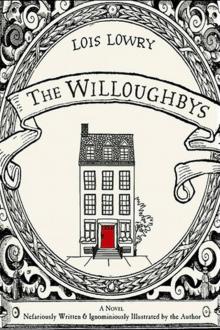 The Willoughbys
The Willoughbys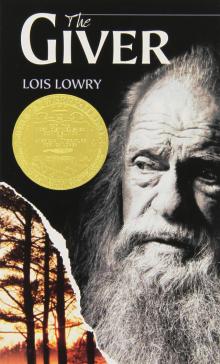 The Giver
The Giver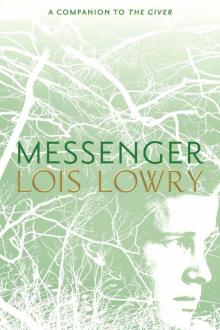 Messenger
Messenger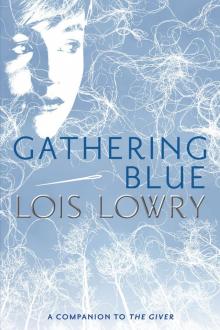 Gathering Blue
Gathering Blue Gooney Bird and All Her Charms
Gooney Bird and All Her Charms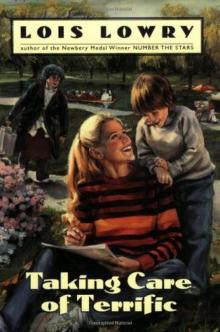 Taking Care of Terrific
Taking Care of Terrific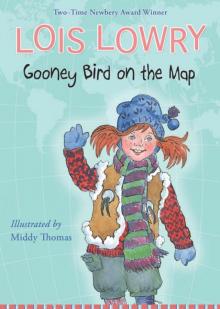 Gooney Bird on the Map
Gooney Bird on the Map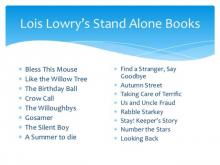 The Birthday Ball
The Birthday Ball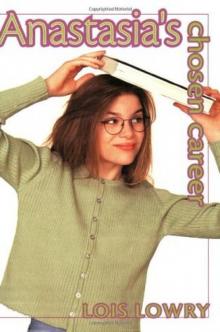 Anastasia's Chosen Career
Anastasia's Chosen Career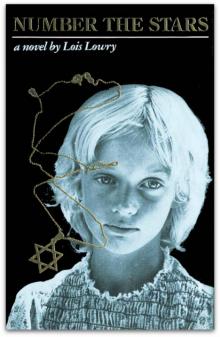 Number the Stars
Number the Stars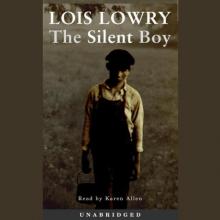 The Silent Boy
The Silent Boy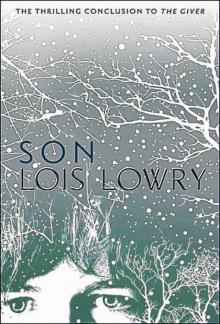 Son
Son Attaboy, Sam!
Attaboy, Sam! Gooney Bird Greene
Gooney Bird Greene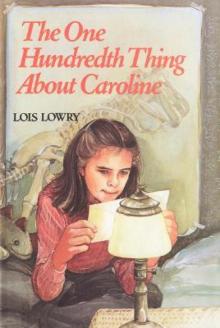 The One Hundredth Thing About Caroline
The One Hundredth Thing About Caroline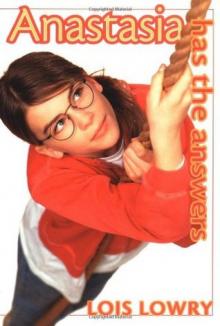 Anastasia Has the Answers
Anastasia Has the Answers Your Move, J. P.!
Your Move, J. P.!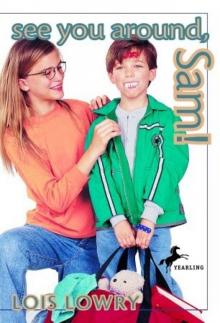 See You Around, Sam!
See You Around, Sam! All About Sam
All About Sam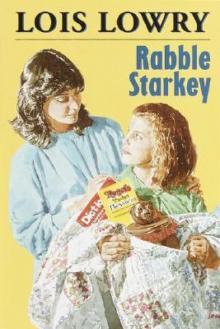 Rabble Starkey
Rabble Starkey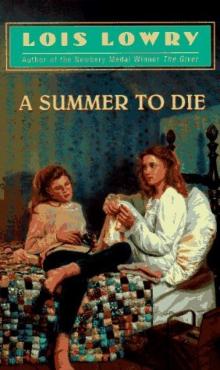 A Summer to Die
A Summer to Die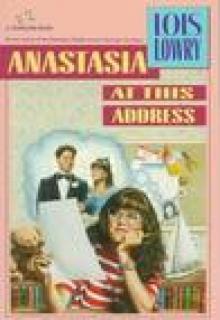 Anastasia at This Address
Anastasia at This Address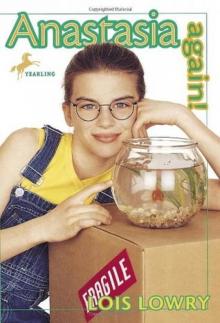 Anastasia Again!
Anastasia Again!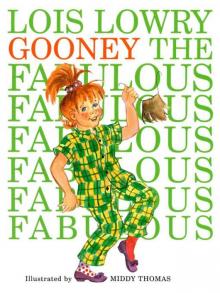 Gooney the Fabulous
Gooney the Fabulous Gossamer
Gossamer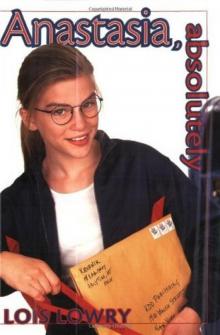 Anastasia, Absolutely
Anastasia, Absolutely Gooney Bird Is So Absurd
Gooney Bird Is So Absurd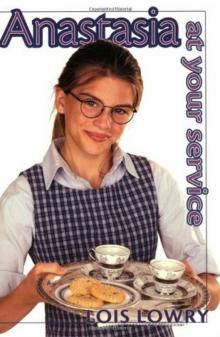 Anastasia at Your Service
Anastasia at Your Service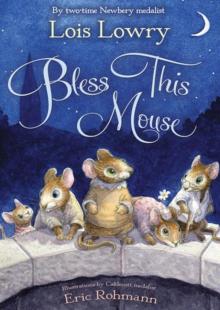 Bless this Mouse
Bless this Mouse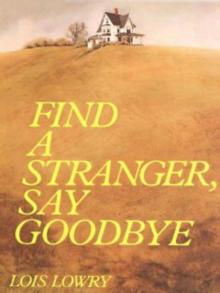 Find a Stranger, Say Goodbye
Find a Stranger, Say Goodbye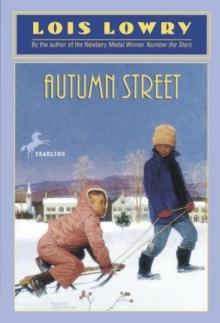 Autumn Street
Autumn Street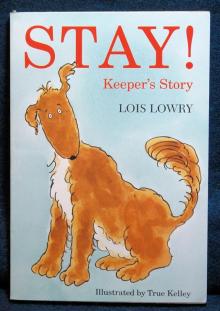 Stay Keepers Story
Stay Keepers Story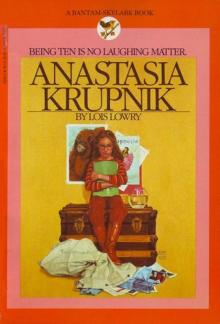 Anastasia Krupnik
Anastasia Krupnik Zooman Sam
Zooman Sam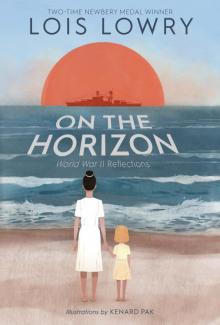 On the Horizon
On the Horizon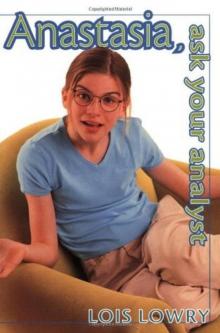 Anastasia, Ask Your Analyst
Anastasia, Ask Your Analyst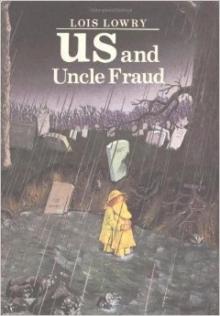 Us and Uncle Fraud
Us and Uncle Fraud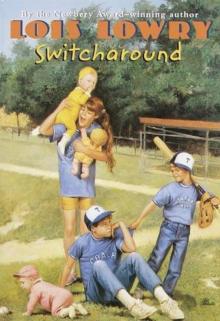 Switcharound
Switcharound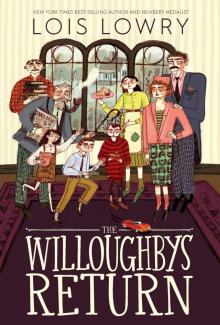 The Willoughbys Return
The Willoughbys Return Dear America: Like the Willow Tree
Dear America: Like the Willow Tree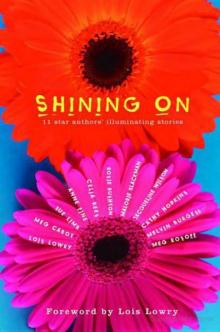 Shining On
Shining On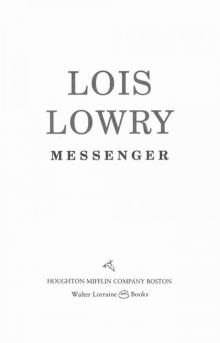 Messenger (The Giver Trilogy)
Messenger (The Giver Trilogy)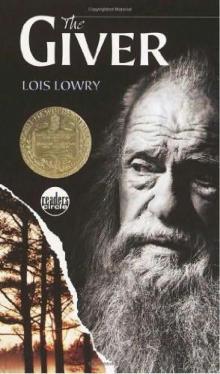 Giver Trilogy 01 - The Giver
Giver Trilogy 01 - The Giver